In the News This Week

On October 2, Americans tuned in for the vice presidential debate between Republican nominee Governor Sarah Palin and Democratic nominee Senator Joe Biden. It was predicted to be the most-viewed vice presidential debate in history!
To get a firsthand account of what happened, Oprah talks to the woman at the center of the event—moderator Gwen Ifill, a veteran journalist from PBS's The NewsHour and Washington Week. "It was kind of exciting, wasn't it? A lot of buildup, a lot of drama. And in the end, they both held their own," Gwen says. "I'm feeling relieved, mostly, that it's all over."
One element of the predebate drama was a medical rumor circulating on the Internet. "You know, it's one of those rumors that actually turns out to be true!" Gwen says.
She explains that she was preparing for the debate at home, reading everything she could find about both candidates. "I had left a biography of Sarah Palin and a biography of Joe Biden on the stairs. You know the way you do, thinking, 'I'll grab it on the way down'?" she says. "Except I forgot they were there. Bam! I went down. Broke an ankle. ... I played hurt last night."
Gwen ended up moderating the debate with a splint on her broken ankle and her leg elevated, but says she wasn't in pain during the debate. "I've decided adrenaline is better than drugs," she says. "I felt no pain whatsoever last night once the debate began." Gwen says she is scheduled to have surgery on Monday.
To get a firsthand account of what happened, Oprah talks to the woman at the center of the event—moderator Gwen Ifill, a veteran journalist from PBS's The NewsHour and Washington Week. "It was kind of exciting, wasn't it? A lot of buildup, a lot of drama. And in the end, they both held their own," Gwen says. "I'm feeling relieved, mostly, that it's all over."
One element of the predebate drama was a medical rumor circulating on the Internet. "You know, it's one of those rumors that actually turns out to be true!" Gwen says.
She explains that she was preparing for the debate at home, reading everything she could find about both candidates. "I had left a biography of Sarah Palin and a biography of Joe Biden on the stairs. You know the way you do, thinking, 'I'll grab it on the way down'?" she says. "Except I forgot they were there. Bam! I went down. Broke an ankle. ... I played hurt last night."
Gwen ended up moderating the debate with a splint on her broken ankle and her leg elevated, but says she wasn't in pain during the debate. "I've decided adrenaline is better than drugs," she says. "I felt no pain whatsoever last night once the debate began." Gwen says she is scheduled to have surgery on Monday.
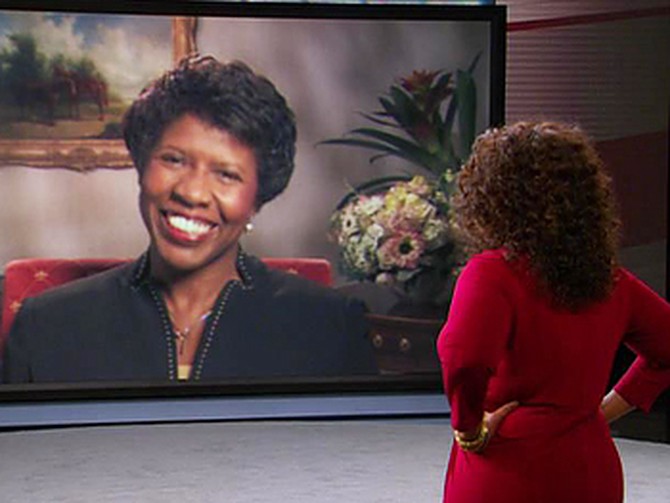
The other predebate drama concerned a book Gwen is currently writing about the new generation of black politicians, including Newark mayor Corey Booker, Massachusetts governor Deval Patrick, Alabama congressman Archer Davis...and presidential candidate Senator Barack Obama. "The book is about all of that and all about civil rights—where it brought us and where it's going, and how we're at this turning point," Gwen says.
Because the book will include commentary on Senator Obama's presidential campaign, some pundits complained that Gwen would be biased during the debate between Governor Palin and Senator Biden.
Gwen says she never hid that she was working on the book. "I've written about it for Time magazine. I've written about it for Essence magazine. It's been written about in Vogue. But for some reason, the day before the debate, all of sudden it became a subject of some drama because a lot of very conservative folks decided—mind you once again, the day before the debate—that this was a pro-Obama book and I was hopelessly conflicted," she says. "As I pointed out to them, to those who wanted to listen anyway, I haven't even written the Barack Obama chapter yet because no one knows how it's going to end."
After the dustup with some conservative pundits, Gwen says she received messages of support from many people, including some working in the McCain campaign. "This isn't fair," she says they told her. "We know you. We know that you're a straight-ahead reporter."
Because the book will include commentary on Senator Obama's presidential campaign, some pundits complained that Gwen would be biased during the debate between Governor Palin and Senator Biden.
Gwen says she never hid that she was working on the book. "I've written about it for Time magazine. I've written about it for Essence magazine. It's been written about in Vogue. But for some reason, the day before the debate, all of sudden it became a subject of some drama because a lot of very conservative folks decided—mind you once again, the day before the debate—that this was a pro-Obama book and I was hopelessly conflicted," she says. "As I pointed out to them, to those who wanted to listen anyway, I haven't even written the Barack Obama chapter yet because no one knows how it's going to end."
After the dustup with some conservative pundits, Gwen says she received messages of support from many people, including some working in the McCain campaign. "This isn't fair," she says they told her. "We know you. We know that you're a straight-ahead reporter."
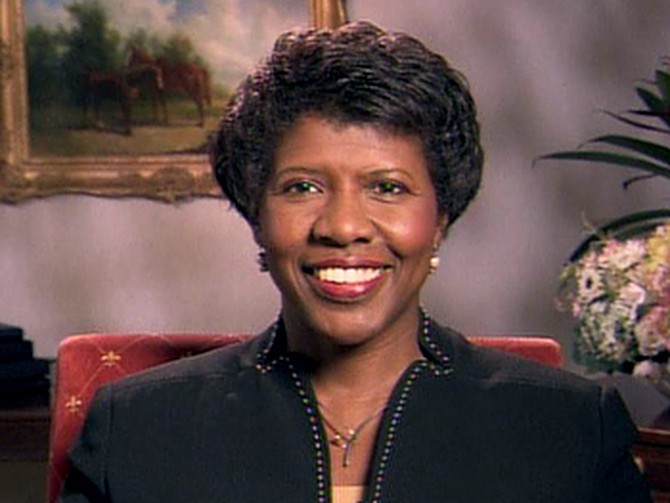
Gwen says she didn't start working on her questions until she knew who the vice presidential candidates were, and both Governor Palin and Senator Biden were announced just weeks ago.
After those announcements, Gwen says she commenced reading everything they've done over the years—including reviewing their previous debates to create a massive list of questions. From there, she started editing. "Take [the list] from hundreds of questions you'd love to ask to the questions which are fair and neutral and will engage debate rather than inquisition," she says. "My point was this was a debate about teaching the American people about both of these candidates, not just one. I tried to always come up with questions they could both answer."
Gwen says she actually was able to ask all the questions she wanted to include...and even a few she didn't think she'd get to. "I asked them at one point what their Achilles' heel was—what their great weakness was. And I had decided early on I wasn't going to ask that, but I'm glad I did. It was interesting," she says. "The questions you ask someone who is going to be vice president [are] slightly different from what you ask the person who's going to be president."
After those announcements, Gwen says she commenced reading everything they've done over the years—including reviewing their previous debates to create a massive list of questions. From there, she started editing. "Take [the list] from hundreds of questions you'd love to ask to the questions which are fair and neutral and will engage debate rather than inquisition," she says. "My point was this was a debate about teaching the American people about both of these candidates, not just one. I tried to always come up with questions they could both answer."
Gwen says she actually was able to ask all the questions she wanted to include...and even a few she didn't think she'd get to. "I asked them at one point what their Achilles' heel was—what their great weakness was. And I had decided early on I wasn't going to ask that, but I'm glad I did. It was interesting," she says. "The questions you ask someone who is going to be vice president [are] slightly different from what you ask the person who's going to be president."
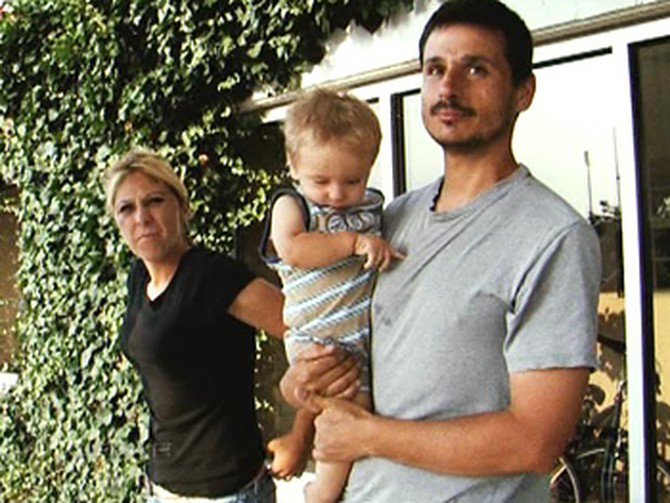
In September, Lisa Ling introduced you the Hawks—a family caught in the grip of the heroin epidemic in central Ohio. Parents Mike and Darla and their teenage sons, Michael and Matt, are addicted. Mike and Darla also have a 14-month-old, Cayden.
While investigating drugs in Ohio, Lisa Ling also met Merry, a 24-year-old mother who is five months pregnant and battling her own addiction.
At the end of that show, the Hawks family and Merry were offered a one-time chance to enter separate rehab centers. All accepted.
Matt was the first to leave for his treatment. After he left, the rest of the family stayed together and shot up heroin for what they said was the last time.
While investigating drugs in Ohio, Lisa Ling also met Merry, a 24-year-old mother who is five months pregnant and battling her own addiction.
At the end of that show, the Hawks family and Merry were offered a one-time chance to enter separate rehab centers. All accepted.
Matt was the first to leave for his treatment. After he left, the rest of the family stayed together and shot up heroin for what they said was the last time.

Since that intervention, Mike entered and then left his rehab in Tennessee...checking into another facility in New York to be closer to Darla and Cayden.
Darla is struggling with her recovery but remains in treatment with Cayden.
Seventeen-year-old Michael left his facility after 13 days in treatment. He returned to Ohio and was arrested for allegedly burglarizing his grandparents' home.
Eighteen-year-old Matt is completing his program and plans to move to a halfway house to continue treatment.
Merry has 20 more days in her treatment program. Everyone says her unborn child is doing fine.
Darla is struggling with her recovery but remains in treatment with Cayden.
Seventeen-year-old Michael left his facility after 13 days in treatment. He returned to Ohio and was arrested for allegedly burglarizing his grandparents' home.
Eighteen-year-old Matt is completing his program and plans to move to a halfway house to continue treatment.
Merry has 20 more days in her treatment program. Everyone says her unborn child is doing fine.
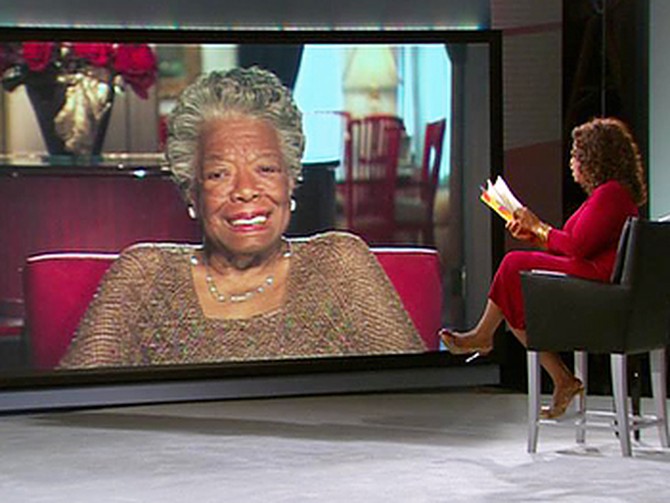
There aren't many people more important to Oprah than Dr. Maya Angelou. "She's truly a treasure—one of our greatest living writers, a poet, a best-selling author, an actress, even a dancer and an XM Radio host. I'm proud to call her my mentor and my friend," Oprah says. "I've said many times Maya Angelou has taught me more in my life than probably any other single human being. And much of that wisdom can be found in a brand new book called Letter to My Daughter."
While Dr. Angelou gave birth to one son, she says this book is to her metaphorical daughters—Oprah and thousands of others. "You are black and white and Asian and Spanish-speaking and Native American, and fat and thin, and you're pretty and plain, gay and straight, Jewish and Muslim," she says. "You're all of that."
While Dr. Angelou gave birth to one son, she says this book is to her metaphorical daughters—Oprah and thousands of others. "You are black and white and Asian and Spanish-speaking and Native American, and fat and thin, and you're pretty and plain, gay and straight, Jewish and Muslim," she says. "You're all of that."

Dr. Angelou says she wrote Letter to My Daughter to highlight the truth. "Sometimes adults—that is, people much older than you—don't tell you the truth. Sometimes they don't care enough. Sometimes they don't have the courage to tell you the truth—not everything they know, but the truth about certain things," she says.
The stories in Letters to My Daughter are not taken as an opportunity to preach, Dr. Angelou says. "I don't say, 'This is what I learned' or 'This is what you should learn,'" she says. "Rather, I set you up in the situation and ask you to learn something. It will make your life richer, finer. You will be more proud of yourself, more happy to be within your own skin. You will like yourself more."
While the book allows readers to draw their own lessons from what Dr. Angelou has learned, she says there is one greatest lesson in life. "Dare to love. Now, by love I don't mean indulgence. I don't mean sentimentality. I don't mean mush," she says. "I mean that condition in the human spirit so profound that it allows us to dare to step out on the word of God, on one's own word. This condition that allows us to like somebody. With love, we may be able to look through complexion and see community. That's only with love. Oprah, it may be that stuff that keeps the stars in the firmament or the blood racing through our veins. I mean daring to care."
The stories in Letters to My Daughter are not taken as an opportunity to preach, Dr. Angelou says. "I don't say, 'This is what I learned' or 'This is what you should learn,'" she says. "Rather, I set you up in the situation and ask you to learn something. It will make your life richer, finer. You will be more proud of yourself, more happy to be within your own skin. You will like yourself more."
While the book allows readers to draw their own lessons from what Dr. Angelou has learned, she says there is one greatest lesson in life. "Dare to love. Now, by love I don't mean indulgence. I don't mean sentimentality. I don't mean mush," she says. "I mean that condition in the human spirit so profound that it allows us to dare to step out on the word of God, on one's own word. This condition that allows us to like somebody. With love, we may be able to look through complexion and see community. That's only with love. Oprah, it may be that stuff that keeps the stars in the firmament or the blood racing through our veins. I mean daring to care."

While so much in the world begs us to fixate on negativity and how different we are from one another, Dr. Angelou says humans are so much more alike than we dare to realize.
"Everybody who wants a job wants a good job, wants to be paid a little more than she's worth—not enough to be embarrassed, but just enough to say, 'I'm making it over.' Everybody in the world who wants children, wants healthy children. Everyone in the world wants safe streets—even those who make the streets unsafe," she says. "In Birmingham, Alabama, or in Birmingham, England; Paris, France, or Paris, Texas...everybody wants somebody to love and to have the unmitigated gall to accept love in return. Everybody."
The desires of the majority of people cut across races, she says. "We are boring mostly," she says. "We live ordinary lives. We want to get the grits on the table or the french fries or fried chicken or the kosher meal. We want to get the food on the table. We want the children to be happy and healthy. Very boring. I mean, it's ordinary. What I mean is, the 'sensationals'—those get the headlines, those get the television cameras on them, but those are not the majority."
If you are able to see your fellow humans as more like you than, Maya says you will reap the rewards. "It will make you happier with yourself," she says. "And you might make some new friends who don't look like you."
"Everybody who wants a job wants a good job, wants to be paid a little more than she's worth—not enough to be embarrassed, but just enough to say, 'I'm making it over.' Everybody in the world who wants children, wants healthy children. Everyone in the world wants safe streets—even those who make the streets unsafe," she says. "In Birmingham, Alabama, or in Birmingham, England; Paris, France, or Paris, Texas...everybody wants somebody to love and to have the unmitigated gall to accept love in return. Everybody."
The desires of the majority of people cut across races, she says. "We are boring mostly," she says. "We live ordinary lives. We want to get the grits on the table or the french fries or fried chicken or the kosher meal. We want to get the food on the table. We want the children to be happy and healthy. Very boring. I mean, it's ordinary. What I mean is, the 'sensationals'—those get the headlines, those get the television cameras on them, but those are not the majority."
If you are able to see your fellow humans as more like you than, Maya says you will reap the rewards. "It will make you happier with yourself," she says. "And you might make some new friends who don't look like you."
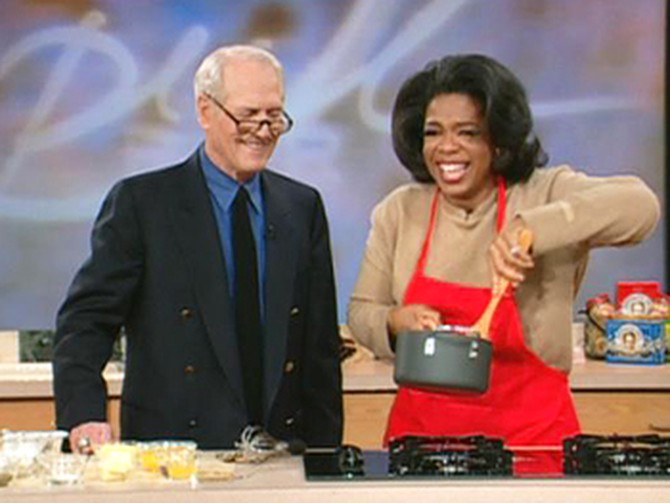
On September 26, 2008, the world lost one of its true legends. From Broadway to Hollywood, Paul Newman won just about every acting award there is. He was a successful competitive race car driver. And his Newman's Own food company raised more than $220 million for charity.
"Who'd have thought that a legendary movie star and a bottle of salad dressing could do so much for the world?" Oprah says.
Struggling to understand what's happening with the economy? Sign up for Economic Crisis 101!
"Who'd have thought that a legendary movie star and a bottle of salad dressing could do so much for the world?" Oprah says.
Struggling to understand what's happening with the economy? Sign up for Economic Crisis 101!
Published 10/03/2008

